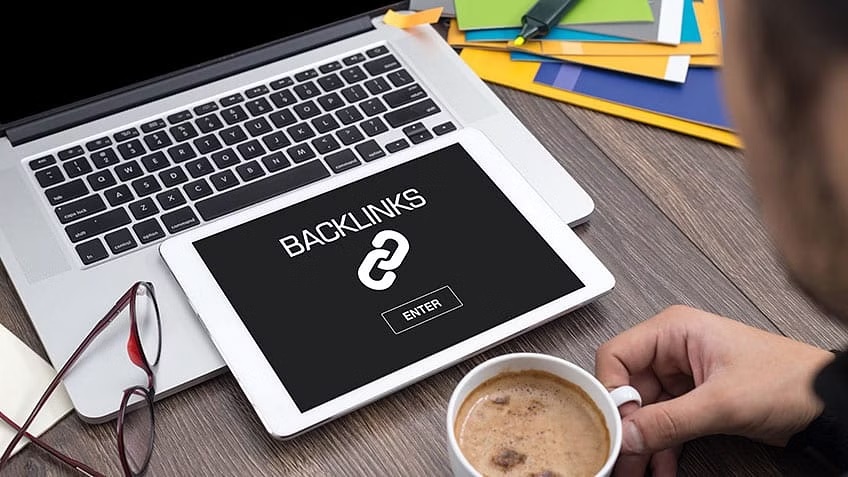
In essence, what do we mean by the term “backlink”?
In SEO jargon, a backlink refers to a situation where one website hyperlinks to another, enabling users to transition from one webpage to another. When other websites link to your site, it is called an SEO backlink. These backlinks can take various forms, such as embedded links in text, images, or navigation items.
Let’s delve into key terms to grasp this better:
- Link: A hyperlink.
- Backlink: The specific text or image on another website that links to your site.
- Internal Links: Text or images on your website that link to other pages within your site.
- Anchor Text: The specific text used when someone links to your website.
- Referring Domain: A website that links to your site.
- URL: The web address, typically where the backlink redirects users to your site.
- Landing Page: The initial page users encounter when entering your site, often through a link.
- Backlink Profile: An overview of all websites and pages that link to your site.
Why Do Backlinks Matter?
Backlinks are important because they facilitate seamless navigation between websites and content. Google considers them a ranking factor when determining which content should appear in search engine results. This is why you frequently hear about their significance from SEO agencies.
What Does Google Officially State?
Google officially makes a few critical points regarding backlinks:
- Google doesn’t prioritise the total number of links pointing to your website. Instead, it assesses links on a case-by-case basis to determine the authority of specific content.
- Google discourages the practice of SEOs artificially building links, labelling it as unnatural, which can even lead to penalties.
This places SEOs in a dilemma because while backlinks are essential for an effective SEO strategy, Google frowns upon attempts to construct links that wouldn’t occur naturally.
Why Does Google Worry About Unnatural Links?
Over time, SEO tactics have evolved, with many attempting to manipulate the system to boost their websites’ search engine rankings. This has sometimes led to the proliferation of low-quality web pages, spam, and a poor user experience. In response, Google has developed systems, such as the Penguin algorithm, to identify unnatural links and either disregard them or penalise websites engaged in such spammy behaviour.
Understanding Domain Authority
Domain authority is a metric created by SEOs to provide a quick summary of the number of links a website has and their quality. However, Google does not use domain authority when determining which web pages should rank higher in search results. There is also a metric called page authority, which assesses individual pages similarly but oversimplifies the evaluation compared to Google. Authority is typically scored on a scale of 0-100, with 100 representing the highest level of authority and 0 indicating a brand-new website with no links.
Domain authority can be a helpful indicator when evaluating the value of a backlink, but factors like monthly traffic should also be considered.
Nofollow vs. Follow Links
Nofollow and follow are instructions applied to links, suggesting whether Google should crawl (follow) or not crawl (nofollow) them to their destination. When a nofollow link is set, it prevents Google from passing page rank from the source to the destination page.
This distinction exists for backlinks because Google encourages sponsored content users to use the nofollow tag on their links. Sponsored content might involve a business providing free products or payments for a website to review or discuss them. In Google’s view, this constitutes an unnatural link, hence the nofollow instruction.
How to Acquire Backlinks
- Create valuable content and get it in front of the right audience. Other websites will likely refer to high-quality, informative content that adds value to your niche. Building connections with influencers and relevant publications can help you promote your content.
- Utilise Digital PR to gain backlinks. Journalists constantly seek sources and contributors for their articles, making this an effective strategy to generate backlinks.
- Find existing articles in your niche and contribute to them. Using SEO and content tools, locate relevant articles that have already been published, create content that complements them, reach out to the author, and try to become a source for their work.
- Guest posting can be a way to place your content on other blogs. Sometimes, blogs may request that you contribute to their site in exchange. This can be a valuable method to establish connections and expand your reach.
Backlinks in Local SEO
Backlinks also play a vital role in local SEO. Obtaining links from local businesses is a crucial aspect of Google’s local algorithm. Additionally, acquiring backlinks from local directories can be an effective method to build local references and citations. SEO tools are available to link your Google Business location with a syndication tool, ensuring that your business information is disseminated across trusted local directories.
These are just a few of the numerous techniques for acquiring SEO backlinks. If you need assistance with your SEO strategy, contact Eyeweb today.
